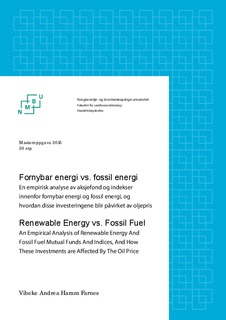Fornybar energi vs. fossil energi : en empirisk analyse av aksjefond og indekser innenfor fornybar energi og fossil energi, og hvordan disse investeringene blir påvirket av oljepris
Master thesis
Permanent lenke
http://hdl.handle.net/11250/2353292Utgivelsesdato
2015-10-08Metadata
Vis full innførselSamlinger
- Master's theses (HH) [1072]
Sammendrag
Formålet med denne oppgaven er å se om det finnes noen forskjell i risikojustert ytelse for investeringer i selskaper som driver sin virksomhet innenfor fornybar energi og fossil energi i perioden januar 2009 til desember 2014. Til dette formål analyseres aksjefond og indekser som inneholder selskaper innenfor fornybar energi og fossil energi. I tillegg vil jeg se på om det er et signifikant forhold mellom oljepris og disse fondene og indeksene som inneholder energiselskaper. Resultatene viser at det ikke er signifikant forskjell i ytelsen til fondene og indeksene som inneholder selskaper innenfor henholdsvis fornybar energi og fossil energi i perioden 2009 til 2014. Det er heller ikke signifikant forskjell i ytelse mellom noen av fondene og indeksene som investerer i energiselskaper og aksjemarkedet generelt, målt ved MSCI World Index, i perioden 2009 til 2014. I perioden 2013 til 2014 finnes det likevel en signifikant forskjell i ytelse mellom fondene og indeksene. Fondene og indeksene som inneholder selskaper innenfor fornybar energi, og MSCI World Index, har hatt en signifikant bedre ytelse i forhold til fondene og indeksene som inneholder selskaper innenfor fossil energi i perioden 2013 til 2014. Det er ingen signifikant forskjell i avkasting mellom MSCI World Index og fondene og indeksene som inneholder selskaper innenfor fornybar energi i perioden 2013 til 2014. Resultater fra analyse av forholdet mellom oljepris og avkastning til fondene og indeksene som inneholder energiselskaper viser at det er et signifikant kortsiktig forhold mellom variablene. Fondene og indeksene innenfor fossil energi blir likevel ikke påvirket signifikant mer av oljepris enn det fondene og indeksene innenfor fornybar energi blir. Analysen av det langsiktige forholdet, målt ved en kointegrasjonsanalyse, viser at det ikke er noe signifikant forhold mellom oljepris, og fondene og indeksene som inneholder energiselskaper. In this study I evaluate the performance of renewable energy and fossil fuel mutual funds and indices in the period from 2009 to 2014. I will also evaluate the relationship between these funds and indices and the spot price and futures price for oil. The results show that there is no significant difference between the renewable energy mutual funds and indices and the fossil fuel mutual funds and indices in the period from 2009 to 2014. There is also no significant difference between the funds and indices and the stock market as a whole, measured by MSCI World Index, in the period from 2009 to 2014. However, in the period from 2013 to 2014, the renewable energy mutual funds and indices, and MSCI World Index, has had a significant better performance than the fossil fuel mutual funds and indices. There is no significant difference between MSCI World Index and the renewable energy mutual fund and indices in the period 2013 to 2014. The results from the analysis of the relationship between the mutual funds and indices and oil price, shows that there is a significant short-term relationship between the variables. However, the fossil fuel mutual funds and indices are not significantly more affected by the oil price than the renewable energy funds and indices. The analysis of the long-term equilibrium, measured by a cointegration analysis, shows that there is no significant relationship between the oil price and the mutual funds and indices.
Utgiver
Norwegian University of Life Sciences, ÅsBeslektede innførsler
Viser innførsler beslektet ved tittel, forfatter og emneord.
-
Integrating renewable energy into Nigeria's energy mix : implications for Nigeria's energy security
Obideyi, Oluwatoni Onyeka (Master thesis, 2017)With increased awareness in the importance of energy to economic and social development, the need to attain energy security has increasingly become a paramount factor in the energy agenda of countries. To expand their ... -
Guarantees of origin for electricity - an analysis of its potential to increase new renewable energy in the North European energy system
Martinsen, Thomas; Mouilleron, Marine (MINA fagrapport;67, Report, 2020)The guarantee of origin scheme (GO) has been criticized for its insignificant impact on the development of new renewable energy and the contribution to reducing CO2 emissions. The reason is that sales of GO from old ... -
Open windows and closed doors : a case study of energy efficiency improving technologies given low energy prices and institutional barriers in the Ukrainian heating market
Evensen, Simen Gurholt; Fedoryshyn, Nadiya (Master thesis, 2012-06-22)The level of energy efficiency in Ukraine has been very low compared to the European countries ever since the country gained independence in 1991. Energy efficiency improvement and reduction of gas dependence has been a ...
